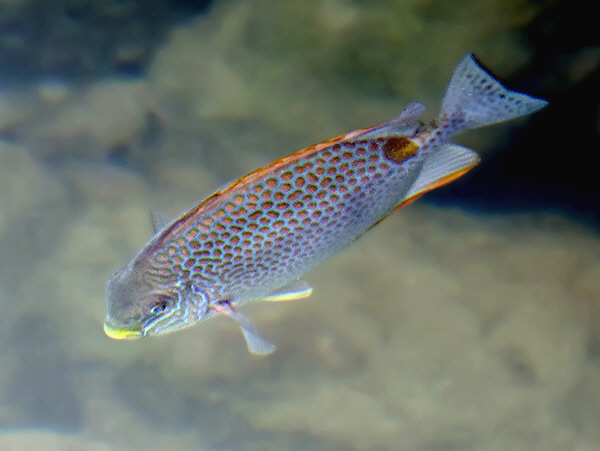
Fig 1
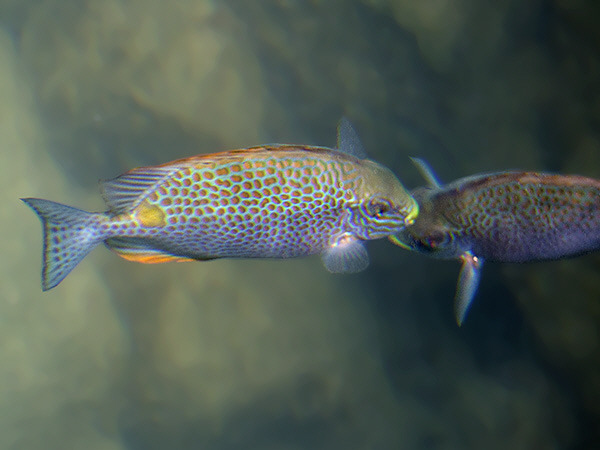
Fig 2
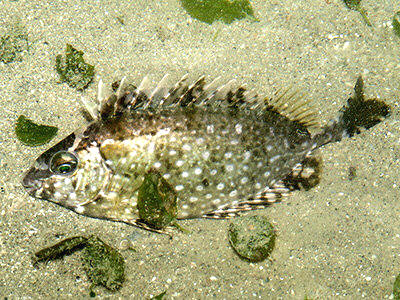
Fig 3
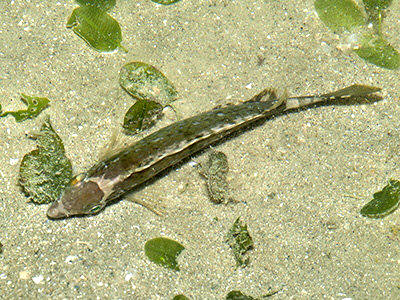
Fig 4
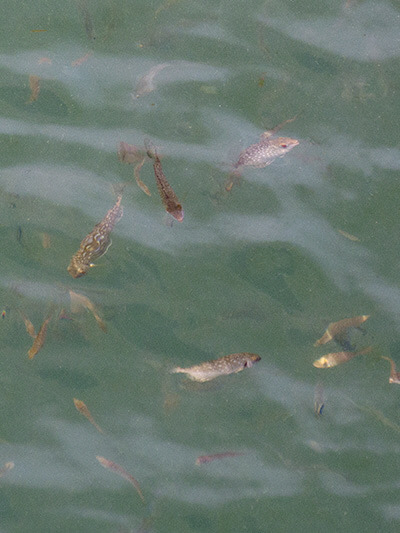
Fig 5
|
Order : Perciformes
Family : SIGANIDAE
Species : 29 species in 1 genus (as of 2024)
Maximum Length : at least 42 cm (e.g. Siganus guttatus).
Siganidae is a small family comprising 29 species of 'rabbitfish' in the
sole genus Siganus.
Rabbitfishes are so-called because their snouts resemble the noses of
rabbits. They are also known as 'spinefoots' probably due to the presence of
numerous spines on a number of fins which can give a painful sting.
Rabbitfishes occur in a
range of habitats including shallow coral reefs, rocky areas, and beneath
man-made structures such as jetties, boardwalks and pontoons. Some
species are boldly patterned and others are heavily spotted.
Most species appear to be exclusively herbivorous, feeding mainly on algae,
but recent studies have documented Siganus rivulatus (Marbled
Rabbitfish) feeding on soft, gelatinous parts of live jellyfishes and comb
jellies (Bos et al, 2016).
Bos & Fransen (2018) observed Siganus canaliculatus (White-spotted
Rabbitfish) visiting 'cleaning stations' by day to have external parasites
removed by shrimps or cleaner fishes.
Another study of Siganus canaliculatus in Palau documented large
groups of this species coming together four or five days after the new moon
to spawn: on average nearly 300,000 eggs were released by females (Hasse et
al, 1997). The same authors documented marked darkening of Siganus
canaliculatus when fish were stressed. When disturbed in shallow water,
they may lie on their sides, and flatten themselves on the substrate while
swimming slowly away.
Native
populations of Siganus occur in the Indian Ocean, Southeast Asia and
the Pacific Ocean.
Figs 1 and 2 : Dorso-lateral view (oblique-angle
view) of a pair of Orange-spotted Rabbitfish (Siganus
guttatus) beneath a jetty at Sentosa Island, Singapore. According to
Fishbase this species may grow up to 42
cm, but typically reaches 25 cm.
Figs 3 and 4 : Side view and top view of a White-spotted Rabbitfish (Siganus
canaliculatus) at Changi Beach, Singapore. According to
Fishbase this species may reach 40 cm, but typically reaches no more
than 20 cm.
Fig 5 : A shoal of Siganus sp. at Pangkor Laut, Peninsular Malaysia.
References :
Bos, A. R., Cruz-Rivera, E., & Sanad, A. M. (2016). Herbivorous fishes
Siganus rivulatus (Siganidae) and Zebrasoma desjardinii
(Acanthuridae) feed on Ctenophora and Scyphozoa in the Red Sea. Marine
Biodiversity, 47(1), 243-246.
Bos, A. R., & Fransen, C. H. (2018). Nocturnal cleaning of sleeping
rabbitfish, Siganus canaliculatus, by the cleaner shrimp,
Urocaridella antonbruunii (Decapoda, Palaemonidae). Crustaceana, 91(2),
239-241.
Hasse, J. J., Madraisau, B. B., & McVey, J. P. (1977). Some aspects of the
life history of Siganus canaliculatus (Park) (Pisces: Siganidae) in
Palau. Micronesica, 13(2), 297-312.
Links :
Fishbase
- Siganidae
Thanks to Tan Heok Hui and Kelvin Lim for helping
with identification.
|